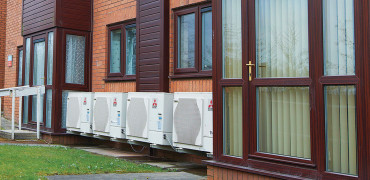As a nation, we spend a staggering £13.5 billion a year on heating our homes and this is only going to increase as we see the price of gas and oil continue to rise.
This means we are seeing more people struggle to pay the bills, with too many left with the choice between heating and eating.
Housing providers across the land have already realised that finding ways to help tenants reduce the amount they spend on heating is a good move all round. This has been one of the main drivers of the adoption of air source heat pumps in social housing – especially in off-gas areas.
There are now thousands of examples where helping tenants transition from solid fuel, oil or LPG has led to happier homes with smaller heating bills.
George is so passionate about housing sustainability that he’s had an Ecodan fitted in his London home
The benefits don’t stop there
In addition to providing tenants with reliable, renewable heating through a heat pump, Housing Associations can also notice other benefits, such as a reduction in the number of late payments or tenant complaints, as warmer tenants are more likely to be happier (and healthier).
There are other longer term savings and benefits, such as a better corporate image because of the reduction in carbon emissions, and heat pumps can actually help reduce maintenance costs.
The use of inefficient heating systems over prolonged periods of time can cause extensive damage to a property. Mould and damp is unhealthy, unsightly and damages furnishings; at its worst it can render a house entirely uninhabitable and unprofitable.
Repairing its damage is a time-consuming and needless expense, because without addressing the underlying cause of the damp, you only serve to lay hard work and money to waste.
And if the problems are left unchecked for long enough, damp can actually damage the structural integrity of a house. The house can then be condemned until it is fit once more to be inhabited.
Because heat pumps are best suited to continuous running, they provide a more constant level of comfort for tenants when the house is occupied and can help reduce mould, damp and damage occurring within the property when it is vacated.
By allowing tenants to heat all of their homes cost-effectively, rather than just one or two rooms, the property incurs less damage and requires less maintenance. This reduces the risk of it falling into a state of disrepair.



